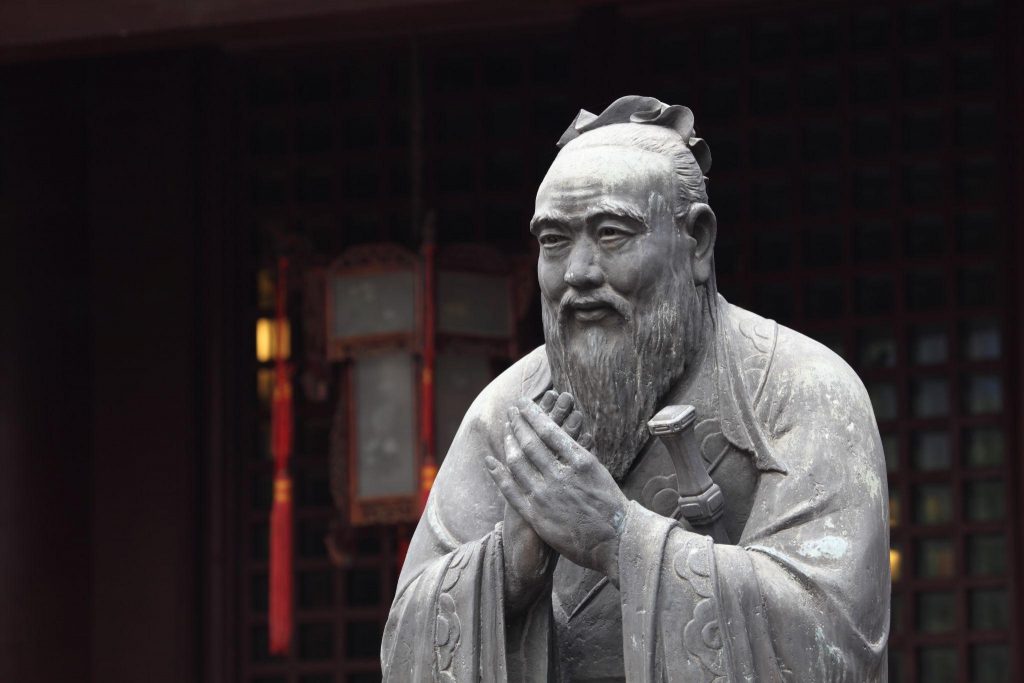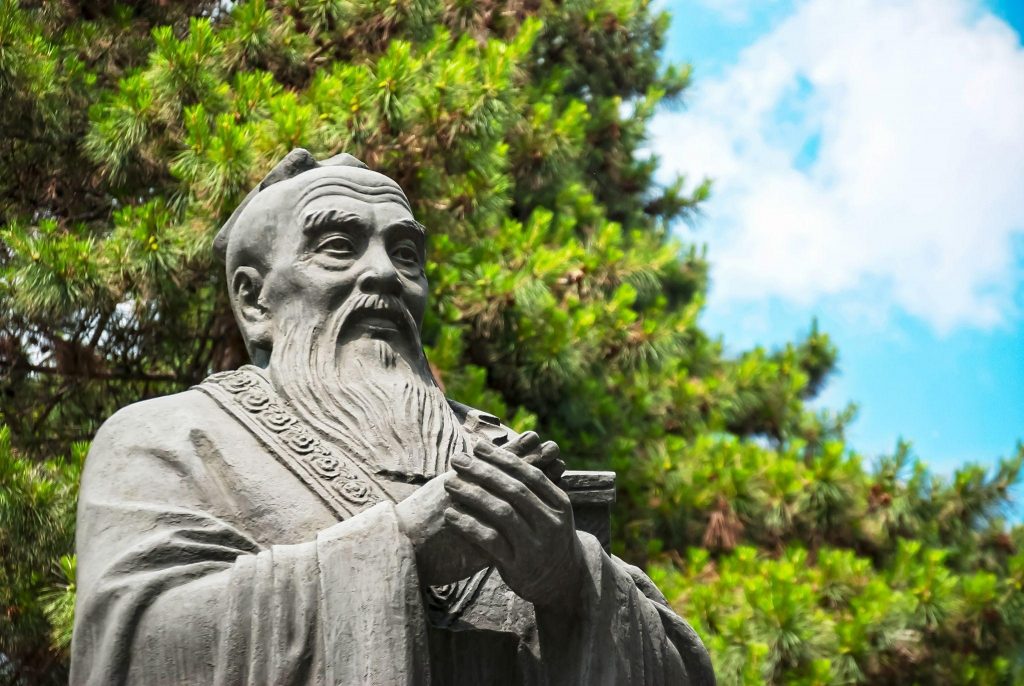THE WORLD’S #1 EXECUTIVE COACHING AND BUSINESS COACHING BLOG SINCE 2017.
A Journey Through Time: Confucius and the Principles of Authentic Leadership
December 21, 2023 | Category: Blog, Intelligent Leadership | Last updated on: March 12, 2025
The core principles of intelligent leadership are timeless and universal. Ancient Chinese philosopher Confucius identified them 2,500 years ago and defined them in his teachings that continue to deliver lessons in optimal leadership.
Confucius’ leadership values include benevolence, righteousness, and a continuous focus on the cultivation of character as the supporting pillars of ethical, effective leadership.
“To know what you know and what you do not know, that is true knowledge.” – Confucius.
Ancient Chinese philosopher Confucius was among the first to define and record the principles of authentic, virtuous leadership predicated upon ethical decision-making.
Although interspersed with concepts like The Mandate of Heaven, which attempts to lend leaders’ powers a supernatural dimension, Confucius’ views and understanding of leadership carry valuable lessons for today’s business leaders.

Confucius never thought his teachings would have a global impact.
Many of the concepts Confucius has defined and detailed coincide with the tenets of modern intelligent leadership.
The Confucian values include honesty, benevolence, empathy, compassion, education, and personal growth.
For the sake of relevance, we should look at Confucius’ leadership concepts and teachings in relation to the four pillars of the Western theory of intelligent leadership, namely:
- Individual consideration
- Intellectual stimulation
- Motivation through inspiration
- Leadership influence
Historical leadership offers outstanding examples of optimal leadership behavior coupled with personal virtue and benevolence. Confucius’ leadership teachings provide some of the earliest examples in this sense. Learning from historical leadership examples is a privilege no serious leader and leadership coaching expert can afford to forego.
The concepts and basics of effective intelligent leadership are universal. You will find many of Confucius’ concepts about leadership in my books and other leadership development works. I, too, focus my leadership coaching on authenticity, trust, personal growth, and leadership character.
Understanding Confucius
Born in 551 BC, Confucius lived during a period known in Chinese history as The Warring States. Although it was a time of strife and constant war, this period also allowed great freedom of thought. Confucius, whose real name was Kung Zi, meaning Master King, saw education as a tool of social reform.
According to him, every person could receive an education and improve as a consequence. This approach to education was a novelty for that era. The belief that only the nobility could receive an education was widespread.
Confucius understood the power of universal education. He knew that universal education would have to be the first step toward an ideal society that could accommodate full personal fulfillment.
Through his teachings, he promoted and embodied many other leadership qualities, like:
- Empathy. According to Confucius, leaders must care for the well-being of their followers while understanding their needs and concerns.
- Respect for one’s forebears. In Confucius’ view, leaders who respect and honor their forebears are more inclined to respect and appreciate their reports.
- Leading by example. Confucius believed that leaders should embody the qualities they expect from their reports.
- Focus on education. It was Confucius’ firm belief that education makes leaders. Only through education can a person achieve the moral and intellectual standing leadership requires.
- Humility. Confucius considered humility an indispensable prerequisite of a state of mind that allows leaders to continue to learn.
- Adherence to rituals. Confucius viewed traditional rituals and rites as parts of the moral fabric of society that leaders should aim to preserve and develop.
Authenticity and Character
Confucius consistently promoted a set of leadership principles he deemed correct and effective. His commitment to these principles never wavered.
Leadership integrity is a central element of Confucian philosophy. Confucius understood that character is the source of true leadership. Leadership is the outward emission of a leader’s authentic character and is, therefore, impossible to simulate.
Becoming a successful leader in the Confucian sense is not easy. Confucius believed in leading by example, observing the principles of ethical leadership, focusing on continuous character development, and showing empathy and compassion.
Confucius knew that no one could start the journey to effective leadership anywhere but on the “low ground.” The Confucian perspective requires leaders to achieve the internal goal of individual perfection and the external goal of exemplary leadership. These goals align perfectly with some of the stated goals of modern, intelligent leadership coaching.
Confucius lived well over two millennia ago. Actual records of his life and day-to-day exploits are extremely scarce. His teachings represent the best window into his soul and attitude toward effective leadership.
His teachings make it clear that he appreciated humility and saw it as an essential leadership quality. In a collection of his sayings titled “Analects,” his disciples have recorded him praising leadership humility thusly: “Is it not gentlemanly not to take offense when others fail to appreciate your abilities?”
Confucius was keen on the accurate and ethical use of language. He reportedly stated: “If language be not in accordance with the truth of things, affairs cannot be carried on to success.”
Confucian philosophy and modern leadership coaching agree that character is the source of optimal, effective leadership. Therefore, its authenticity is unquestionable. People can read character and can always tell when a leader’s actions aren’t authentic. A lack of authenticity inevitably begets the loss of trust.
Personal Growth and Continuous Improvement
Confucius’ view on personal growth and continuous improvement was an all-encompassing, holistic one. He understood the interdependence of moral, social, and intellectual aspects of personal growth and shaped his teachings accordingly.
Self-cultivation is an essential part of Confucian philosophy, and it involves the following aspects:
- Self-reflection
- Lifelong learning
- Adaptability
- The intentional cultivation of virtues
- Teaching others
- Modeling positive behaviors
“When we see men of a contrary character, we should turn inward and examine ourselves.”
Self-reflection is a leitmotif of Confucius’ teachings, and it defines, to a large extent, his attitude toward personal growth and self-improvement.
Confucius used self-reflection as a tool for personal development and growth.
According to traditional accounts, one of the defining moments of Confucius’ life was his encounter with the founder of Taoism, Laozi. The conversation that ensued between the two is said to have sparked intense moments of self-reflection in Confucius regarding the nature of virtue.
The ancient philosopher experienced another opportunity for self-reflection when he was exiled from his home state of Lu. This period of hardship provided him with reasons and an opportunity for self-reflection about virtue and its role in life. The experience was also transformative, leaving a lasting mark on how Confucius developed his philosophical ideas.
Confucius’ commitment to growth was unwavering and determined. In this respect, his teachings provide an inexhaustible source of inspiration for growth-focused leadership coaching experts like myself.
Lessons for Today’s Business Leaders
Although produced two and a half millennia ago, Confucius’ teachings continue to fulfill their purpose. Due to their format, they translate well to modern business leadership. For leaders interested in self-improvement, they carry a bevy of lessons, including:
- Continued focus on character development. Character is the source of genuine leadership.
- Benevolent leadership. Intelligent leaders are genuinely concerned with the well-being of their employees and look to cater to their needs.
- Ethical conduct. Moral integrity is key to building trust and leading people effectively.
- Leading by example. Confucian philosophy appreciates leadership by example.
- Optimal decision-making. Confucius advocates for the careful consideration of decisions and their likely consequences.
- A focus on relationships. According to Confucius’ leadership principles, meaningful relationships are at the heart of effective leadership.
- Adaptability and humility. Confucius saw humility as a prerequisite for learning and adaptability.
To improve their leadership based on Confucian principles, leaders can cultivate benevolent leadership intentionally while prioritizing an ethical approach.
They can also invest in character development through leadership coaching, promote diversity and inclusivity, and focus on building meaningful relationships.
These lessons align perfectly with the leadership principles on which I predicate my coaching efforts.
Applying Confucius’ Wisdom
By developing a genuine interest in the well-being of their employees and celebrating their professional achievements, leaders can take practical steps toward benevolent leadership.
They can set a clear code of ethics for their organizations and communicate it to their employees clearly and often. Ethical considerations should be part of the decision-making process that aligns with organizational values.
Intelligent leaders provide their employees with opportunities for professional development. They also foster organizational cultures focused on coaching and mentorship.
To develop empathy and build meaningful relationships, leaders should focus on developing active listening skills and putting them to use. They can schedule one-on-one meetings with employees to understand their perspectives, needs, and challenges.
The key to achieving these leadership development objectives is to embark on a personal journey of growth and authentic leadership in alignment with the Confucian leadership principles.
Conclusion
More than two and a half millennia ago, Confucius recognized the leadership principles that continue to guide intelligent leadership coaching efforts to this day. His commitment to ethical conduct, leadership authenticity, and personal growth are universally valid principles indispensable for leadership development.
Confucius emphasized the need for the intentional cultivation of one’s character. Leaders can cultivate their characters through education, mentorship, and coaching.
Leadership coaching can redirect your focus to effective personal growth by driving you inward and effecting deep changes in your character.




